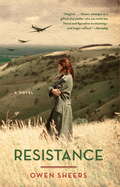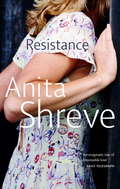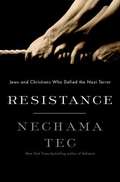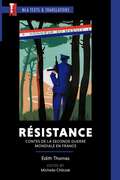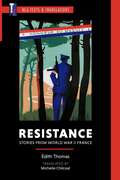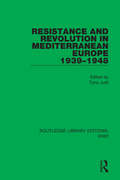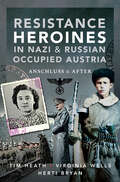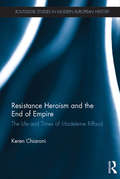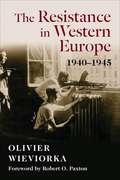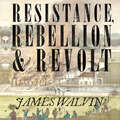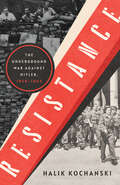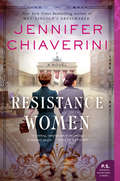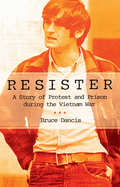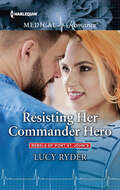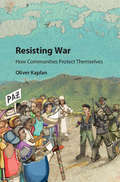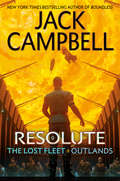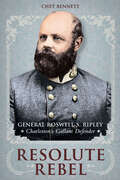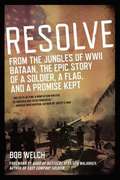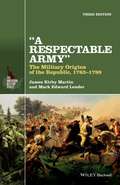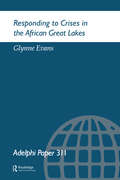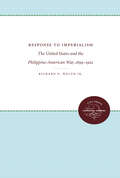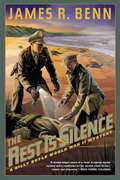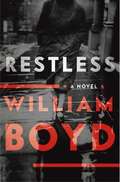- Table View
- List View
Resistance
by Owen SheersResistance is a beautifully written and powerful story set during an imagined occupation of Britain by Nazi Germany in World War II. In a remote and rugged Welsh valley in 1944, in the wake of a German invasion, all the men have disappeared overnight, apparently to join the underground resistance. Their abandoned wives, a tiny group of farm women, are soon trapped in the valley by an unusually harsh winter--along with a handful of war-weary German soldiers on a secret mission. The need to survive drives the soldiers and the women into uneasy relationships that test both their personal and national loyalties. But when the snow finally melts, bringing them back into contact with the war that has been raging beyond their mountains, they must face the dramatic consequences of their choices.From the Trade Paperback edition.t as the pressure of the war beyond presses in on this isolated community, this fragile state of harmony is increasingly threatened.Imbued with immense imaginative breadth and confidence, Owen Sheers's debut novel unfolds with the pace and intensity of a thriller. A hymn to the glorious landscape of the Welsh border territories and a portrait of a community under siege, Resistance is a first novel of grace and power.
Resistance
by Anita ShreveAs the wife of a Resistance member in German-occupied Belgium, Claire Daussois has grown used to hiding strange men in her attic. By the end of 1943, the tiny room has housed dozens of Allied airmen, soldiers and other refugees, whom Claire nurses and harbours from the perpetual threat of discovery by the Gestapo.The B-17 bomber that crash-lands outside Claire's village of Delahaut contains the man who will be both the last and the most significant of the attic's residents: US Air Force pilot Ted Brice. Ted is found severely wounded and semi-conscious by ten-year-old Jean Benoit minutes before the Germans begin their search for survivors. Knowing of Claire's connections with the Resistance, and desperate to atone for his father's shameful collaboration, Jean realises that Claire is the pilot's only hope of survival.The month that follows will stay with them both for the rest of their lives. A few weeks only, a handful of days, it is a period in which the war recedes in the face of more powerful forces - before imposing itself once more with shocking suddenness.
Resistance: Jews and Christians Who Defied the Nazi Terror
by Nechama TecIn Resistance, Tec draws on first-hand accounts, interviews, and other sources to reveal the full range of tactics employed to resist the Nazi regime in Poland. She compares Jewish and non-Jewish groups, showing that they faced vastly different conditions. The Jewish resistance had its own particular aims, especially the recovery of dignity and the salvation of lives. Tec explores the conditions necessary for resistance, including favorable topography, a supply of arms, and effective leadership, and dedicates the majority of the book to the stories of those who stood up and fought back in any way that they could.
Résistance: Contes de la Seconde Guerre mondiale en France (Texts and Translations #34)
by Édith ThomasBased on real events of the French Resistance during World War II, Édith Thomas's stories explore how ordinary people respond to the extraordinary conditions of political occupation. The stories, first published under the title Contes d'Auxois by an underground press in 1943, were written to oppose Vichy-Nazi propaganda and to offer encouragement to civilians who felt resigned to defeat.Whether lining up to wait for food, tuning in to a forbidden radio broadcast, adapting to living side by side with German soldiers, or preparing for an act of sabotage, the characters in these stories must make choices in highly compromised circumstances on a daily basis. As the characters confront their own suffering and that of others, their actions inspire readers to consider the nature of heroism, the idea that people can share a common humanity with their enemies, and the possibility for individuals to find solidarity in an overwhelming, isolating world.
Resistance: Stories from World War II France (Texts and Translations #34)
by Édith ThomasBased on real events of the French Resistance during World War II, Édith Thomas's stories explore how ordinary people respond to the extraordinary conditions of political occupation. The stories, first published under the title Contes d'Auxois (Auxois Stories) by an underground press in 1943, were written to oppose Vichy-Nazi propaganda and to offer encouragement to civilians who felt resigned to defeat.Whether lining up to wait for food, tuning in to a forbidden radio broadcast, adapting to living side by side with German soldiers, or preparing for an act of sabotage, the characters in these stories must make choices in highly compromised circumstances on a daily basis. As the characters confront their own suffering and that of others, their actions inspire readers to consider the nature of heroism, the idea that people can share a common humanity with their enemies, and the possibility for individuals to find solidarity in an overwhelming, isolating world.
Resistance and Revolution in Mediterranean Europe 1939–1948 (Routledge Library Editions: WW2 #27)
by Tony JudtThis book, first published in 1989, is the first general study of Communism in Mediterranean Europe during and immediately after the war. It sheds light on the origins of Europe’s Cold War East-West divide and probes the common and conflicting interests of the Soviet Union with the separate national and Communist resistance movements. It explores controversial issues including Stalin’s intentions in post-war diplomacy, Communist attitudes to Nazi collaboration in France, and the origins of the Cold War. The decade following the outbreak of the war saw the transformation of society through armed conflict, national resistance and political revolution. The relationship between resistance to Fascism and occupation, on the one hand, and profound social and political changes on the other, was especially marked in southern Europe. In France and Italy, Communist parties emerged as prominent participants in post-war governments; in Yugoslavia the Communist partisans seized full power and effected a social revolution; while a similar attempt in Greece led to a long and bitter civil war.
Resistance Heroines in Nazi & Russian Occupied Austria: Anschluss & After
by Tim Heath Virginia Wells Herti BryanAustria's Anschluss - its 'annexation' - saw no gunfire, no bloodcurdling screams of Stukas overhead or the rumble of heavy artillery when German troops marched in on 12 March 1938. It was no ‘Blitzkrieg’ on the contrary, some Austrians even welcomed the ‘invaders’ and the opportunity to unite the ethnic German peoples under the rule of Austria’s most infamous son, Adolf Hitler. Austria’s wealth of natural and mineral resources were especially useful to support the Third Reich’s aggression in Europe. The Nazis were keen to exploit these assets and many Austrians benefited from increased employment. However, any initial euphoria was soon replaced by fear and anxiety as the brutal reality of the new regime became apparent. Here is the remarkable story of Herti Bryan who, as a young child, witnessed the totalitarian nightmare of Hitler’s dream for world domination. Standing up for what she believed to be right, Herti acted courageously to frustrate the occupying Nazis. In addition to Herti’s story, we learn of the experiences of Milly Keller and Hilde Schubert who shared contempt for the Nazi occupiers. The three girls vividly describe their different experiences during the war, although there is a striking similarity in the even greater terror they were subjected to under the Russian ‘liberators’. In this volume the lives of Herti, Milly and Hilde come together to reveal an astonishing picture of life in occupied Austria. Drawing on unimaginable fortitude, these girls defied domination and fought fearlessly, risking their own lives, to carry out their moral obligation to humanity. This is their story, in their own words and told for the first time.
Resistance Heroism and the End of Empire: The Life and Times of Madeleine Riffaud (Routledge Studies in Modern European History)
by Keren ChiaroniThis book introduces an English-speaking public to the life of Madeleine Riffaud – one of the last living leaders of the French Resistance. It considers the nature of the rebel hero in France’s founding historical narratives (revolution, insurrection, resistance) while asking what contributions such a hero might make to debates on national identity today. Through a series of narrative close-ups, the book offers perspectives on major chapters in nineteenth- and twentieth-century French history through the eyes of activists who experienced them: the Revolution of July 1830 and the 1851 insurrection against Napoleon, as experienced by Riffaud’s ancestor Edme Liron, and the French Resistance, the Vietnam War and French–Algerian conflict as experienced by Riffaud herself. The book aims to explore the kinds of choices individuals face when their beliefs set them at odds with the state, and to suggest that there is a place for individual action in a global arena where state boundaries are becoming increasingly less relevant.
The Resistance in Western Europe, 1940–1945 (European Perspectives: A Series in Social Thought and Cultural Criticism)
by Olivier WieviorkaIn just three months in 1940, Denmark, Norway, Belgium, the Netherlands, Luxembourg, and France fell to the Nazis. The German occupation of Western Europe had begun—but a brave few rose up in defiance. National resistance has long been celebrated in remembrances of World War II, depicted as making significant contributions to the defeat of Nazi Germany. However, the so-called army of shadows drew heavily on the support of London and Washington, a fact often forgotten in postwar Europe.The Resistance in Western Europe, 1940–1945 is a sweeping analytical history of the underground anti-Nazi forces during World War II. Examining clandestine organizations in Norway, Denmark, the Netherlands, Belgium, France, and Italy, Olivier Wieviorka sheds new light on the factors that shaped the resistance and its place in the grand scheme of Anglo-American military strategy. While national actors played a leading role in fomenting resistance, British and American intelligence services and propaganda as well as financial, material, and logistical support were crucial to its activities and growth. Wieviorka illuminates the policies of governments in exile and resistance actors regarding cooperation with the British and Americans, pointing to the persistence of national self-interest and long-standing historical tensions. Drawing on a wide range of archival sources and bringing together the political, diplomatic, and military dimensions of the conflict, this book is the first account of the resistance on a continental scale and from a trans-European perspective.
Resistance, Rebellion & Revolt: How Slavery Was Overthrown
by Professor James WalvinThis long overdue, vivid and wide-ranging examination of the significance of the resistance of the enslaved themselves - from sabotage and running away to outright violent rebellion - shines fresh light on the end of slavery in the Atlantic World. It is high time that this resistance, in addition to abolitionism and other factors, was given its due weight in seeking to understand the overthrow of slavery. Fundamentally, as Walvin shows so clearly, it was the implacable hatred of the enslaved for slavery and their strategies of resistance that made the whole system unsustainable and, ultimately, brought about its downfall. Walvin's approach is original, too, in looking at the Atlantic world as a whole, including the French and Spanish Empires and Brazil, as well as Britain's colonies. In doing so, he casts new light on one of the major shifts in Western history: in the three-hundred years following Columbus's landfall in the Americas, slavery had become a widespread and critical institution. It had seen twelve million Africans forced onto slave ships; a forced migration that had had seismic consequences for Africa. It had transformed the Americas and materially enriched the Western world. It had also been largely unquestioned - in Europe at least, and among slave owners, traders and those who profited from the system. Yet, within a mere seventy-five years during the nineteenth century, slavery had vanished from the Americas: it had declined, collapsed and been destroyed by a complexity of forces that, to this day, remains disputed. As Walvin shows so clearly here, though, it was in large part overthrown by those it had enslaved.
Resistance: The Underground War Against Hitler, 1939-1945
by Halik Kochanski“This is the most comprehensive and best account of resistance I have read. It addresses the story with scholarly objectivity and an absolute lack of sentimentality. So much romantic twaddle is still published . . . it is marvelous to read a study of such breadth and depth, which reaches balanced judgments.” —Max Hastings, The Sunday Times (UK) Resistance is the first book of its kind: a monumental history that finally integrates the many resistance movements against Nazi hegemony in Europe into a single, sweeping narrative of defiance. “To resist, therefore. But how, when and where? There were no laws, no guidelines, no precedents to show the way . . .” —Dutch resister Herman Friedhoff In every country that fell to the Third Reich during the Second World War, from France in the west to parts of the Soviet Union in the east, a resistance movement against Nazi domination emerged. And every country that endured occupation created its own fiercely nationalist account of the role of homegrown resistance in its eventual liberation. Halik Kochanski’s panoramic, prodigiously researched work is a monumental achievement: the first book to strip these disparate national histories of myth and nostalgia and to integrate them into a definitive chronicle of the underground war against the Nazis. Bringing to light many powerful and often little-known stories, Resistance shows how small bands of individuals took actions that could lead not merely to their own deaths, but to the liquidation of their families and their entire communities. As Kochanski demonstrates, most who joined up were not supermen and superwomen, but ordinary people drawn from all walks of life who would not have been expected—least of all by themselves—to become heroes of any kind. Kochanski also covers the sheer variety of resistance activities, from the clandestine press, assistance to Allied servicemen evading capture, and the provision of intelligence to the Allies to the more violent manifestations of resistance through sabotage and armed insurrection. For many people, resistance was not an occupation or an identity, but an activity: a person would deliver a cache of stolen documents to armed partisans and then seamlessly return to their normal life. For Jews under Nazi rule, meanwhile, the stakes at every point were life and death; resistance was less about national restoration than about mere survival. Why resist at all? Who is the real enemy? What kind of future are we risking our lives for? These and other questions animated those who resisted. With penetrating insight, Kochanski reveals that the single quality that defined resistance across borders was resilience: despite the constant arrests and executions, resistance movements rebuilt themselves time and time again. A landmark history that will endure for decades to come, Resistance forces every reader to ask themselves yet another question, this distinct to our own times: “What would I have done?”
Resistance Women: A Novel
by Jennifer ChiaveriniFrom the New York Times bestselling author of Mrs. Lincoln’s Dressmaker, an enthralling historical saga that recreates the danger, romance, and sacrifice of an era and brings to life one courageous, passionate American—Mildred Fish Harnack—and her circle of women friends who waged a clandestine battle against Hitler in Nazi Berlin.After Wisconsin graduate student Mildred Fish marries brilliant German economist Arvid Harnack, she accompanies him to his German homeland, where a promising future awaits. In the thriving intellectual culture of 1930s Berlin, the newlyweds create a rich new life filled with love, friendships, and rewarding work—but the rise of a malevolent new political faction inexorably changes their fate. As Adolf Hitler and his Nazi Party wield violence and lies to seize power, Mildred, Arvid, and their friends resolve to resist. Mildred gathers intelligence for her American contacts, including Martha Dodd, the vivacious and very modern daughter of the US ambassador. Her German friends, aspiring author Greta Kuckoff and literature student Sara Weitz, risk their lives to collect information from journalists, military officers, and officials within the highest levels of the Nazi regime. For years, Mildred’s network stealthily fights to bring down the Third Reich from within. But when Nazi radio operatives detect an errant Russian signal, the Harnack resistance cell is exposed, with fatal consequences. Inspired by actual events, Resistance Women is an enthralling, unforgettable story of ordinary people determined to resist the rise of evil, sacrificing their own lives and liberty to fight injustice and defend the oppressed.
Resister
by Bruce DancisBruce Dancis arrived at Cornell University in 1965 as a youth who was no stranger to political action. He grew up in a radical household and took part in the 1963 March on Washington as a fifteen-year-old. He became the first student at Cornell to defy the draft by tearing up his draft card and soon became a leader of the draft resistance movement. He also turned down a student deferment and refused induction into the armed services. He was the principal organizer of the first mass draft card burning during the Vietnam War, an activist in the Resistance (a nationwide organization against the draft), and a cofounder and president of the Cornell chapter of Students for a Democratic Society. Dancis spent nineteen months in federal prison in Ashland, Kentucky, for his actions against the draft. In Resister, Dancis not only gives readers an insider's account of the antiwar and student protest movements of the sixties but also provides a rare look at the prison experiences of Vietnam-era draft resisters. Intertwining memory, reflection, and history, Dancis offers an engaging firsthand account of some of the era s most iconic events, including the 1963 March on Washington for Jobs and Freedom, the Abbie Hoffman-led "hippie invasion" of the New York Stock Exchange, the antiwar confrontation at the Pentagon in 1967, and the dangerous controversy that erupted at Cornell in 1969 involving African American students, their SDS allies, and the administration and faculty. Along the way, Dancis also explores the relationship between the topical folk and rock music of the era and the political and cultural rebels who sought to change American society.
Resisting Her Commander Hero: The Doctors' Baby Miracle / Resisting Her Commander Hero (rebels Of Port St. John's, Book 1000) (Rebels of Port St. John's)
by Lucy RyderFrankie doesn’t need a hero… But can she fight her attraction to Nate? Paramedic Frankie Bryce is finally over her crush on her late brother’s best friend, former navy SEAL Nate Oliver—but he returns to their hometown acting as if she’s still the wild child teenager he has to protect (he promised her brother he would!). Frankie’s all woman now, and definitely doesn’t need rescuing! Trouble is, this super-sexy hero is impossible to ignore…
Resisting Her Enemy Lord (Mills And Boon Historical Ser.)
by Helen DicksonA tumultuous journeyA tale of war, betrayal and passion…Despite her unhappy marriage, Catherine Stratton had defended her husband’s castle for six years while he was at war. Now widowed, she must travel with John, her late husband’s cousin, who’d fought on the opposing side. Facing danger at every turn, she’s stunned by the heat burning between them. Is this just lust, which will pass…or is this enemy lord a man she can trust with her life and her future?From Harlequin Historical: Your romantic escape to the past.
Resisting War
by Oliver KaplanIn civil conflicts around the world, unarmed civilians take enormous risks to protect themselves and confront heavily armed combatants. This is not just counterintuitive - it is extraordinary. In this book, Oliver Kaplan explores cases from Colombia, with extensions to Afghanistan, Pakistan, Syria, and the Philippines, to show how and why civilians influence armed actors and limit violence. Based on fieldwork and statistical analysis, the book explains how local social organization and cohesion enable both covert and overt nonviolent strategies, including avoidance, cultures of peace, dispute resolution, deception, protest, and negotiation. These 'autonomy' strategies help civilians retain their agency and avoid becoming helpless victims by limiting the inroads of armed groups.
Resolute (The Lost Fleet: Outlands #2)
by Jack CampbellA Nominee for the 2022 Dragon Award for Best Military Science Fiction or Fantasy Admiral John &“Black Jack&” Geary must battle dangers both within and without the Alliance, in this exciting continuation of the New York Times bestselling series.Geary knows that some political factions in the Alliance were just trying to get rid of him when he was assigned to escort a diplomatic and scientific mission to the far reaches of humanity&’s expansion into the galaxy . . . and beyond. But he views his mission as both a duty and an opportunity to make things better wherever he can. And when a crippled Rift Federation ship tumbles out of jump space, Geary leaps into action. But the survivors&’ story isn&’t completely adding up. As Geary investigates, he soon finds himself fending off spies and assassins while leading the fleet as it fights its way across space controlled by the mysterious and hostile aliens whom humans call enigmas. Challenges arrive at every turn, including an unknown alien species that invites the fleet to visit one of their star systems. With little information to go on, Geary must weigh the benefits of potential new allies against the possibility of a trap. The fate of the fleet—and perhaps even the future of humanity—will depend on him making the right decision. If he can stay alive long enough to do that.
Resolute Rebel: General Roswell S. Ripley, Charleston's Gallant Defender
by Chet BennettThe first biography of the general’s complex, often contradictory military service in the US and Confederate armies and his postwar British exploits.Roswell S. Ripley (1823–1887) was a man of considerable contradictions exemplified by his distinguished antebellum service in the US Army, followed by a controversial career as a Confederate general. After the war he was active as an engineer/entrepreneur in Great Britain. Author Chet Bennett contends that these contradictions drew negative appraisals of Ripley from historiographers, and in Resolute Rebel Bennett strives to paint a more balanced picture of the man and his career.Born in Ohio, Ripley graduated from the US Military Academy and served with his classmate Ulysses S. Grant in the Mexican War, during which Ripley was cited for gallantry in combat. In 1849 he published The History of the Mexican War, the first book-length history of the conflict. While stationed at Fort Moultrie in Charleston, Ripley met his Charleston-born wife and began his conversion from unionism to secessionism. After resigning his US Army commission in 1853, Ripley became a sales agent for firearms manufacturers. When South Carolina seceded from the Union, Ripley took a commission in the South Carolina Militia and was later commissioned a brigadier general in the Confederate army. Wounded at the Battle of Antietam in 1862, he carried a bullet in his neck until his death. Unreconciled in defeat, Ripley moved to London, where he unsuccessfully attempted to gain control of arms-manufacturing machinery made for the Confederacy, invented and secured British patents for cannons and artillery shells, and worked as a writer who served the Lost Cause.After twenty-five years researching Ripley in the United States and Great Britain, Bennett asserts that there are possibly two reasons a biography of Ripley has not previously been written. First, it was difficult to research the twenty years he spent in England after the war. Second, Ripley was so denigrated by South Carolina’s governor Francis Pickens and Gen. P. G. T. Beauregard that many writers may have assumed it was not worth the effort and expense. Bennett documents a great disconnect between those negative appraisals and the consummate, sincere military honors bestowed on Ripley by his subordinate officers and the people of Charleston after his death, even though he had been absent for more than twenty years.“A vitally useful addition to the Civil War Charleston literature.” —Civil War Books and Authors“[A] deeply researched and closely argued study. General Roswell S. Ripley emerges from the margins of Civil War history thanks to the able pen of Chet Bennett.” —A. Wilson Greene, author of Civil War Petersburg: Confederate City in the Crucible of War
Resolve
by Bob WelchOn April 9, 1942, thousands of U.S. soldiers surrendered as the Philippines island of Luzon fell to the Japanese. But a few hundred Americans placed their faith in their own hands and headed for the jungles. One of them was twenty-three-year-old Clay Conner Jr., who had never even camped before . . . The obstacles to Conner's survival were as numerous as the enemy soldiers who ultimately put a price on his head: among them malaria, heat, jungle rot, snakes, and mosquitoes. Beyond that, the human threats of betrayal, capture, torture, and death. And, finally, he had to overcome self-doubt, struggle with the despair of burying comrades, deal with friction among his fellow American soldiers, and find a way to survive. But if conflict reveals character, Conner showed himself to be a man apart. Inspired by an unlikely alliance with a tribe of arrow-shooting pygmies, by the words in a dog-eared New Testament, and by a tattered American flag that he vowed to someday triumphantly fly at battalion headquarters, Conner emerged victorious from the jungle--after almost three years. Resolve is the story of an unlikely hero who never surrendered to the enemy--and of a soldier who never gave up hope.
A Respectable Army: The Military Origins of the Republic, 1763-1789
by James Kirby Martin Mark Edward LenderA fully revised and updated third edition of the most established and innovative historical analysis of the Continental Army and its role in the formation of the new republic. Written by two experts in the field of early U. S. history.
Responding to Capability Surprise
by National Research Council Division on Engineering and Physical Sciences Naval Studies Board Committee on Capability Surprise on U.S. Naval ForcesFrom a military operational standpoint, surprise is an event or capability that could affect the outcome of a mission or campaign for which preparations are not in place. By definition, it is not possible to truly anticipate surprise. It is only possible to prevent it (in the sense of minimizing the number of possible surprises by appropriate planning), to create systems that are resilient to an adversary's unexpected actions, or to rapidly and effectively respond when surprised. Responding to Capability Surprise examines the issues surrounding capability surprise, both operational and technical, facing the U.S. Navy, Marine Corps, and Coast Guard. This report selects a few surprises from across a continuum of surprises, from disruptive technologies, to intelligence-inferred capability developments, to operational deployments, and assesses what the Naval Forces are doing (and could do) about them while being mindful of future budgetary declines. The report then examines which processes are in place or could be in place in the Navy, the Marine Corps, and the Coast Guard to address such surprises. Today's U.S. naval forces continue to face a wide range of potential threats in the indefinite future and for this reason must continue to balance and meet their force structure needs. The recommendations of Responding to Capability Surprise will help to ensure more responsive, more resilient, and more adaptive behavior across the organization from the most senior leadership to the individual sailors, Marines, and Coast Guardsmen.
Responding to Crises in the African Great Lakes (Adelphi series)
by G. EvansExamines the international responses to the ethnic conflicts in Burundi and Rwanda from 1993-1997 and their overspill into Zaire. Concludes that the external reaction was impotent and incoherent, and urges a number of changes in response by the international community.
Response to Imperialism: The United States and the Philippine-American War, 1899-1902
by Richard E. WelchThis is a study of the impact of the Filipino Insurrection on American society and politics. It is the first work to evaluate in detail the response of public opinion to that war and to analyze official and popular response in the light of the values and anxieties of the American people. Although that response suggests parallels with American intervention in Vietnam, it must be evaluated within the context of the diplomatic ambitions of the United States during 1899-1902.Originally published 1979.A UNC Press Enduring Edition -- UNC Press Enduring Editions use the latest in digital technology to make available again books from our distinguished backlist that were previously out of print. These editions are published unaltered from the original, and are presented in affordable paperback formats, bringing readers both historical and cultural value.
The Rest Is Silence
by James R. BennThe fog of war surrounding D-Day and Operation Tiger provides cover for one of Billy Boyle's grisliest investigations. When an unidentified corpse washes ashore at Slapton Sands on England's southern coast, US Army Captain Billy Boyle and his partner, Lieutenant Piotr "Kaz" Kazimierz, are assigned to investigate. The Devonshire beach is the home to Operation Tiger, the top-secret rehearsal for the approaching D-Day invasion of Normandy, and the area is restricted; no one seems to know where the corpse could have come from. Luckily, Billy and Kaz have a comfortable place to lay their heads at the end of the day: Kaz's old school chum David lives close by and has agreed to host the two men during their investigation. Glad for a distraction from his duties, Billy settles into life at David's family's fancy manor, Ashcroft, and makes it his mission to get to know its intriguing cast of characters.Just when Billy and Kaz begin to wrap up their case, they find themselves with not one soggy corpse on their hands but hundreds following a terrible tragedy during the D-Day rehearsal. To complicate things, life at Ashcroft has been getting tense: secret agendas, buried histories, and family grudges abound. Then one of the men meets a sudden demise. Was it a heart attack? Or something more sinister?From the Hardcover edition.
Restless: A Novel
by William BoydRestless, as the name implies, is a fast moving (geographically and socially) novel, post WWII England. The war has an impact because the main character is transplanted from Russia to London to spy on her homeland, while equally observant of a few vulnerable Brits. EVA, turned Sally, maintains her cover even to her daughter. Her true identity is revealed further precipitated by affairs of the heart. Restless is replete with intense personal dynamics and their fall-out.
